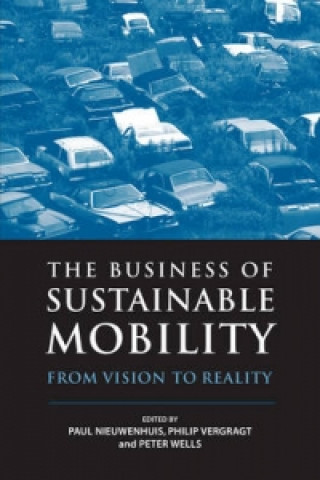
Livrare
Consilier de cumpărături





Nu se pretează? Nu contează! La noi puteți returna bunurile în 30 de zile
 Voucher cadou
orice valoare
Voucher cadou
orice valoare
Cu un voucher cadou nu veți da greș. În schimbul voucherului, destinatarul își poate alege orice din oferta noastră.
Business of Sustainable Mobility
 engleză
engleză
 217 b
217 b
30 de zile pentru retur bunuri
Ar putea de asemenea, să te intereseze


In many parts of the world, there is a crisis of mobility. The choices we have made over the past 200 years on modes and technologies of transport have brought us unprecedented global interaction and in many respects increased personal freedom. However, all this mobility has come at a cost to society, to the economy and to the environment. Mobility is in crisis, but few seem aware of the full extent of it. Though most people will be aware of congestion, accidents (although this aspect is often overlooked), parking restrictions or fuel prices, few will have considered the effects of the dramatic increase in mobility expected in China, India and elsewhere. Nor do many people in their daily lives consider the impact of climate change on our environment and the contribution our cars make to it. It is often thought that technology alone can solve this problem. For some observers, salvation could be achieved by means of hydrogen fuel cells, by hybrid cars, or by increased fuel efficiency, or even by telematics to reduce congestion. This book shows that "technology" may well not be enough in itself and that for a genuinely sustainable transport future far more radical change - affecting many aspects of society - is needed. It is likely, for example, that new business models are needed, as well as users and consumers adopting new forms of behaviour. Disruptive technological innovation may well contribute, but needs to be induced by a combination of market forces and government regulation. Many studies touch on transport and mobility issues and more mainstream books aimed at challenging the dominance of automobility are common, yet works dealing with the longer-term strategic, theoretical and broader conceptual issues needed to inform the move towards more sustainable transport are rare. Yet policy-makers, practitioners, as well as many sections of academia, acknowledge a need for guidance on new thinking on sustainable mobility. This book brings together a range of views representing both leading-edge thinking and best practice in the mobility sector. The individual expert contributions form the basis for framing a broader vision of future mobility and proposed transition trajectories towards that future. Much of the effort reflected in the chapters in this book is concerned with going beyond the "technofix" of new cars, to confront the more difficult challenges of institutional, cultural and social change within and beyond the industry that have to be resolved in the transition towards sustainability. It therefore seeks to break through the conventional boundary between engineering and the social sciences, and the contributors come from both sides of this traditional but unnecessary divide, combining economists, engineers, geographers, designers and others. The work is based on the sustainable mobility stream in the 2003 International Greening of Industry Network conference in San Francisco. This event brought together experts from industry and government, and the book combines some of the papers presented there, developed and updated into full chapters, with a number of additional chapters to capture some of the themes that emerged from the conference. The central problem addressed in this book is the private car: how to power it, how to build it and how to deliver it to customers in a more sustainable future. It starts with ideas of radical innovation in the propulsion system of the car, notably the hydrogen fuel cell. In one section, the book examines business models that could be used to deliver automobility in a more sustainable manner. This section looks at how the car is made and used, and looks beyond it by examining how we could change those aspects in our quest for sustainable mobility. The book then considers a number of recently introduced vehicles and alternative vehicle concepts within the context of a dominant existing paradigm. These vary from a minimalist single-seat commuter to a powertrain exchange concept that could breathe new life into the electric vehicle. A number of chapters then report on current practice and experience in the initial moves toward more sustainable automobility. Finally, more visionary views are presented to look at what conclusions we can draw from the strands discussed and suggest possible future scenarios: where do we go from here? When thinking about the car, it is often not appreciated to what extent our modern culture is integrated with the car and its systems: we have literally built our world around the car in its current form, and this inevitably shapes the scope for constructing sustainable mobility. We therefore need to tackle any change to the current automobility paradigm on a very broad front and we need to be prepared for the possibly dramatic social and economic changes we may bring about by changing just some elements. The Business of Sustainable Mobility will be essential reading for academics, practitioners, policy-makers and others interested in the latest thinking on sustainable mobility.
Informații despre carte
 engleză
engleză




 Cum să cumpăr
Cum să cumpăr
























